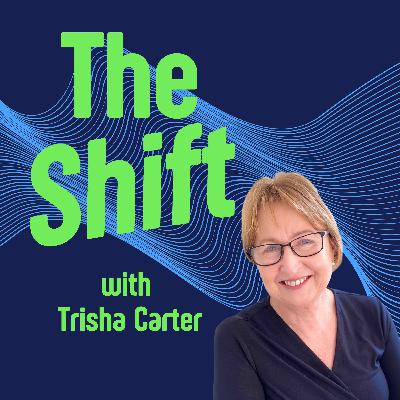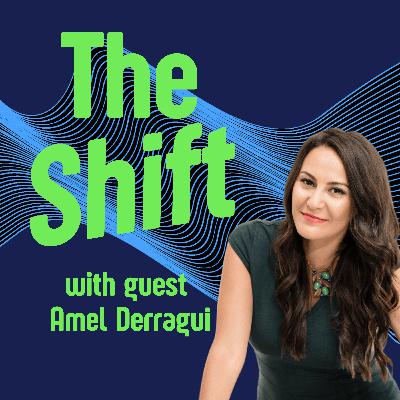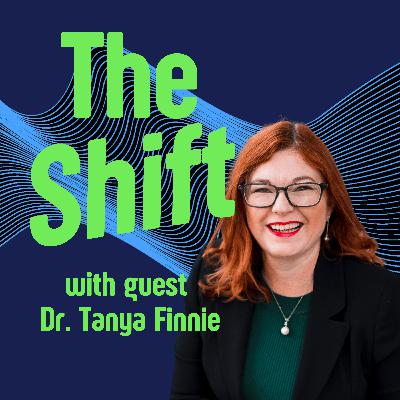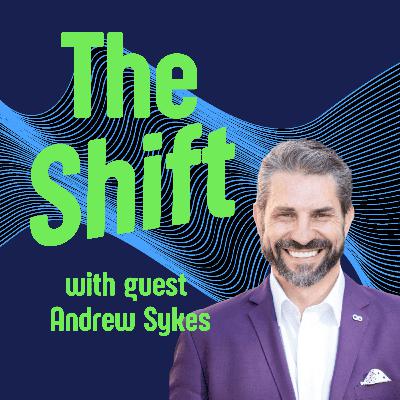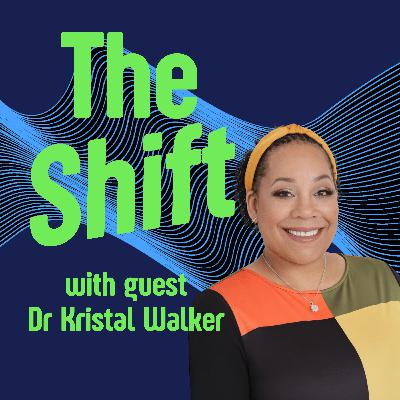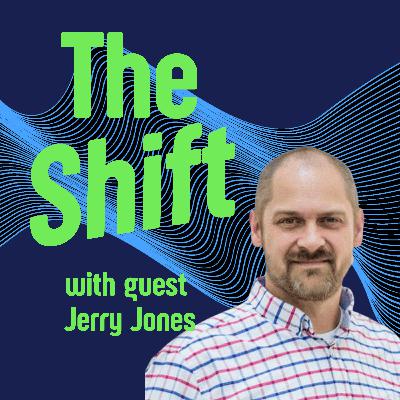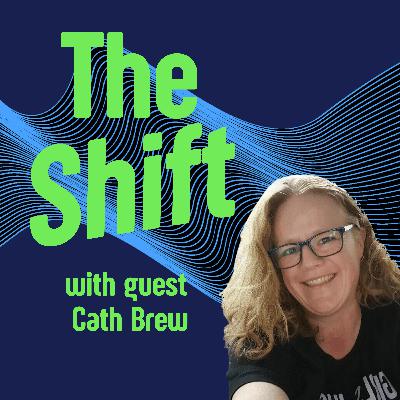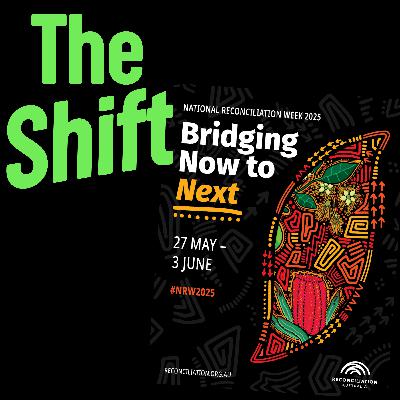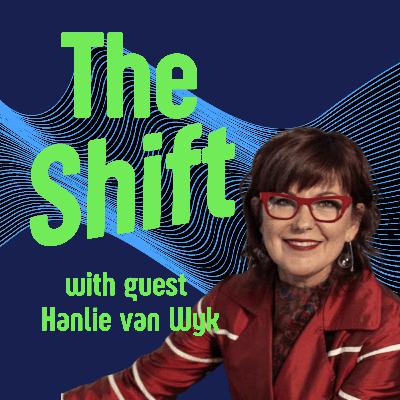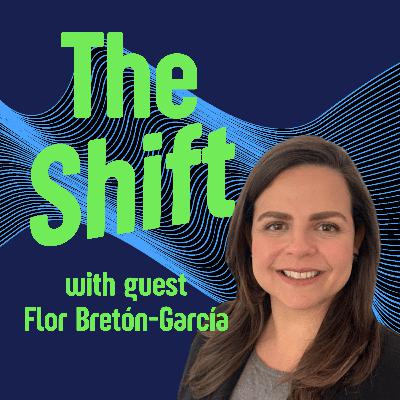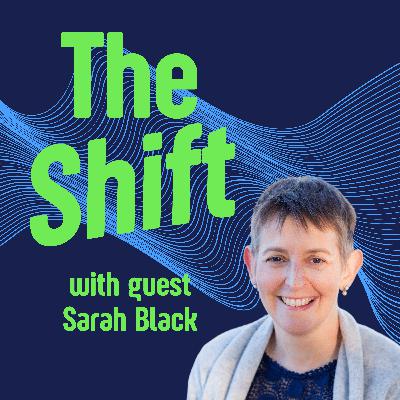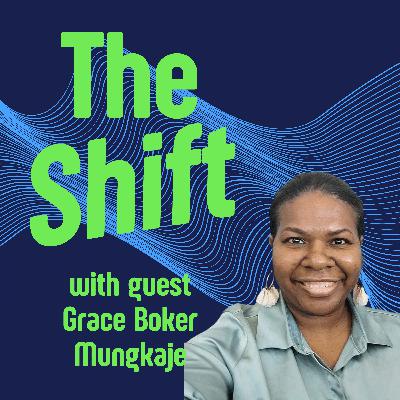Discover The Shift
The Shift

The Shift
Author: Trisha Carter
Subscribed: 1Played: 3Subscribe
Share
© Copyright 2025 Trisha Carter
Description
In a series of interviews with authors and experts from around the world, The Shift unpacks how to increase awareness of ourselves, and others and to shift our perspectives to see things differently. Join Trisha Carter, an Organisational Psychologist and explorer of Cultural Intelligence as she dives into cultural meta-cognition and learns more about how to experience those Shifts.
65 Episodes
Reverse
In this solo episode, Trisha examines a critical question that every global professional using AI should consider: Are artificial intelligence systems as globally representative as we assume? Drawing on groundbreaking 2010 research about WEIRD (Western, Educated, Industrialised, Rich, Democratic) populations in psychology, she explores whether today's AI models might face similar challenges.Through conversations with Claude from Anthropic and ChatGPT's Monday persona, Trisha uncovers surprising perspectives on data sources, training biases, and the cultural blind spots that might influence AI responses. These AI systems offer candid assessments of their own capabilities when it comes to representing diverse global viewpoints, revealing insights that could reshape how we interact with artificial intelligence.Can artificial intelligence develop genuine cultural intelligence, or does it require culturally intelligent humans to unlock its potential? What would it mean to bring your CQ to every AI interaction rather than assuming these systems provide universal, unbiased knowledge? Whether you're a leader implementing AI tools across cultures, an HR professional considering AI solutions, or anyone curious about the intersection of technology and cultural intelligence, this conversation challenges fundamental assumptions about artificial intelligence as a neutral, global knowledge source.Make sure you join Trisha in this journey of growth and discovery throughout the year via Substack or LinkedIn.
In this episode, Trisha explores how teams can move beyond cultural stereotypes to build environments where everyone feels valued and understood. What happens when cultural training leaves participants feeling uncomfortable about their own backgrounds? How can we shift from oversimplified country-based assumptions to embracing the complexity that exists within every individual?Sparked by a story shared at the Employee Mobility Institute's recent summit, Trisha examines the critical difference between cultural competence—knowing about other cultures—and cultural intelligence—being able to function effectively together as unique teams. She challenges listeners to consider whether we're reinforcing divisions or co-creating understanding in our workplace interactions.This episode offers valuable insights for global mobility professionals, team leaders, and anyone working in culturally diverse environments who want to transform how their teams navigate differences together.Check out The Employee Mobility Institute (TEMi) - Mobility Exchange Compass for Change SummitMake sure you join Trisha in this journey of growth and discovery throughout the year via Substack or LinkedIn.
In this episode, Trisha interviews Amel Derragui, a truly global citizen, business coach, and powerhouse behind The Time is Now and the Cosmopolitan Table. Born in India to Algerian parents and raised across Serbia, Algeria, and Uganda, Amel has built her career helping women create portable businesses while navigating cultures worldwide.What happens when a 14-year-old witnesses racial fights at an international school and decides to take action? How does a school canteen project teach us about breaking down barriers through shared experiences?Amel's journey from teenage entrepreneur to global community builder reveals the complex intersection of entrepreneurship and social impact. Through compelling stories spanning continents and decades, this conversation will challenge how you think about identity, justice, and building bridges in our divided world. Connect with Amel at thetimeisnow.biz and learn more about her work empowering globally mobile women through entrepreneurship.Make sure you join Trisha in this journey of growth and discovery throughout the year via Substack or LinkedIn.
In this episode, Trisha revisits her conversation with Dr. Tanya Finnie, introducing it with context about Tanya's newly released book "From Shadows to Safari." What happens when someone grows up witnessing apartheid's segregation, yet is raised with values that challenge the system around them? How do early experiences of injustice shape a lifelong commitment to bringing people together across cultural divides?This revisited conversation explores the complex journey from South Africa to Australia, examining how childhood experiences of racism and cultural difference can become the foundation for transformative leadership in diversity and inclusion. In their original discussion, Tanya shares compelling stories about adapting to new cultures, from misunderstanding Australian dinner party etiquette to her unique approach of inviting strangers to share meals while travelling alone.Tanya's book "From Shadows to Safari" provides deeper context to the stories shared in this conversation. Get your copy at redheadcommunications.com/living-book/#subscribeConnect with Tanya on LinkedIn and via her website.Make sure you join Trisha in this journey of growth and discovery throughout the year via Substack or LinkedIn.
In this solo episode, Trisha explores whether the same cultural intelligence capabilities that help us work across cultures might also be tools for building peace.Drawing from insights at the International Positive Psychology Association World Congress, Trisha examines Peter Singer's concept of expanding our "moral circle" and Barbara Fredrickson's research on positive emotions, sparked by reflections from David Livermore and Martin Seligman.Discover how CQ Strategy, Knowledge, Drive, and Action might offer pathways beyond tribalism, and learn practical approaches for designing learning experiences that broaden perspectives rather than reinforce divisions.Resources mentioned include Peter Singer's work on expanding moral circles (petersinger.info), David Livermore's cultural intelligence research (davidlivermore.com), and Martin Seligman's positive psychology foundations (positivepsychology.com).Make sure you join Trisha in this journey of growth and discovery throughout the year via Substack or LinkedIn.
In this episode, Trisha interviews Andrew Sykes, author, speaker, and founder of Habits at Work, who brings the science of behavioural change into business performance. Andrew is a lecturer at the Kellogg School of Management, where he helps leaders build trustworthy organisations.Drawing from his powerful personal shift during the 1995 Rugby World Cup in South Africa, Andrew explores how trust is built "floor by floor" like a skyscraper. The conversation delves into why trust often breaks down in diverse teams and how cultural intelligence intersects with trust-building.Andrew reveals practical strategies for building trust through intentional habits, especially when working across cultural differences. He shares insights on why demonstrating curiosity and care can transcend cultural barriers and how organisations can systematically embed trustworthy practices into their culture.Connect with Andrew via LinkedIn, his website, the Habits at Work website, and the website for executive experiences Cerene Life . Make sure you join Trisha in this journey of growth and discovery throughout the year via Substack or LinkedIn.
In this episode, Trisha interviews Dr. Kristal Walker, Vice President of Employee Wellbeing at Sweetwater and a certified professional in training management. Dr. Kristal shares her remarkable transformation from high school dropout to doctoral graduate, revealing how this journey fundamentally shaped her approach to leadership and creating inclusive environments where people don't have to "code switch or shrink" to belong.They explore Dr. Kristal's innovative Four D Learning Lifecycle (Design, Develop, Deliver, Debrief) for designing cultural intelligence training that creates lasting change, and dive deep into the powerful concept of "brave spaces" versus safe spaces. Dr. Kristal challenges conventional thinking by reframing a critical question many professionals face: instead of asking "How do I fit in?" she advocates for "How do I stay grounded while I navigate this system?" This shift in perspective offers a transformative approach to authentic leadership in diverse corporate environments.Through personal anecdotes and professional insights, Dr. Kristal demonstrates how authenticity serves as the foundation of credibility and how leaders can maintain their authentic selves while delivering exceptional results for their organisations.Connect with Dr Kristal Walker on LinkedIn.Make sure you join Trisha in this journey of growth and discovery throughout the year via Substack or LinkedIn.
This week, Trisha interviews Jerry Jones, founder of Culture Blend and a learning strategist with over 15 years of experience helping organisations navigate cultural transitions. Jerry brings unique insights from coaching more than a thousand professionals through significant cultural shifts, having lived and worked in China for a decade himself.The conversation reveals Jerry's counterintuitive approach to learning design and why he believes most training fails before it starts. Jerry shares a profound shift moment from a deeply personal conversation with his son that challenged his assumptions about understanding and perspective, demonstrating how the most powerful learning happens when we step back and truly listen.They explore Jerry's philosophy that "growth happens when people feel seen, challenged, and supported" and uncover his surprising strategies for helping teams get unstuck. The discussion takes an unexpected turn into Jerry's thoughts on AI's impact on humanity and whether technology will ultimately bring us closer together or drive us further apart.Jerry also shares insights from an eye-opening experience in North Korea and reveals why he thinks we should "postpone" rather than lower our expectations during major transitions. This perspective challenges conventional wisdom about change management.Connect with Jerry via his website thecultureblend.com, LinkedIn and check out his Podcast Diesel and Clooney Unpack the WorldMake sure you join Trisha in this journey of growth and discovery throughout the year via Substack or LinkedIn.
In this Pride Month episode, Trisha revisits her powerful conversation with Cath Brew, a global LGBTQ+ consultant and shamanic practitioner who brings a unique somatic perspective to cultural intelligence. Cath explores how our bodies often communicate cultural awareness before our minds catch up, offering practical alternatives to traditional mindfulness approaches.The conversation delves into Cath's profound shift moment about learning to trust her intuition, her insights from working with Aboriginal culture in Australia, and her approach to navigating difficult LGBTQ+ conversations through body awareness. Cath's beautiful metaphor of building boardwalks between communities offers practical wisdom for anyone seeking to understand across cultural divides.What makes this episode special is Trisha's guided exercise at the end, where listeners practice Cath's technique of noticing physical responses to cultural difference, giving feelings colour, texture, and size to transform them into actionable insights. Whether you're comfortable with traditional reflection methods or seeking alternative approaches to cultural intelligence, this episode offers tools for recognising when your body signals cultural discomfort.Connect with Cath on LinkedIn and ask her to send her free resource to help guide your physical and emotional observations. You can learn about Cath's work as an LGBTQ+ Consultant and Coach here and about her work helping people heal from emotional pain hereMake sure you join Trisha in this journey of growth and discovery throughout the year via Substack or LinkedIn.
In this episode, Trisha takes listeners back to the fundamentals of Cultural Intelligence (CQ), exploring all four capabilities through the lens of Australia's National Reconciliation Week. After 55 episodes focusing primarily on CQ Strategy, she provides a comprehensive overview of the complete CQ framework: Drive (motivation), Knowledge (understanding), Strategy (metacognition), and Action (behavioural adaptation).Using National Reconciliation Week as a practical example, Trisha demonstrates how each CQ capability can be developed and applied in real-world contexts. The episode includes insights from Sharon Gray (Episode 28), who speaks from her Kamilaroi and Scottish heritage about building cultural understanding and community engagement. Through personal anecdotes and practical applications, listeners discover how cultural intelligence isn't about mastering everything at once, but developing capabilities that work together like instruments in harmony.Key insights include understanding your cultural motivations, building knowledge thoughtfully, practising metacognitive reflection, and adapting behaviours meaningfully. Trisha emphasises moving beyond performative gestures to genuine cultural engagement, whether in workplace settings or community contexts.You can connect with Sharon via LinkedIn and listen to her episode, 'Sharon Gray - Winangar Guru: Listen Deeply, Go Slowly and Respect Everything' HereMake sure you join Trisha in this journey of growth and discovery throughout the year via Substack or LinkedIn.
In this episode, Trisha interviews Hanlie van Wyk, a systems thinker, social scientist, and cultural insights advisor whose work spans South Africa, the UK, Singapore, and the United States. They explore Hanlie's concept of "human eco-cultures" viewing organisational cultures as ecosystems that leaders can proactively design rather than simply manage. The conversation delves into how her hate crime research in South Africa shifted her perspective and contributed to national legislation, demonstrating how Cultural Intelligence (CQ) can address foundational biases before they escalate to discrimination and violence. Key insights include how leaders experience their greatest shifts when they realise actions speak louder than words, and Hanlie's inspiring vision of becoming "reasonable revolutionaries" who forge new paths with courage and kindness.Connect with Hanlie van Wyk. Resources mentioned include the Anti-Defamation League's Pyramid of Hate and Bronfenbrenner's Ecological Systems Theory.Make sure you join Trisha in this journey of growth and discovery throughout the year via Substack or LinkedIn.
This week, Trisha continues her exploration of cultural intelligence by introducing the P.A.U.S.E. Process, a practical framework for responding effectively to cultural shift moments. Building on last week's S.H.I.F.T. Signals, Trisha breaks down each step of the P.A.U.S.E. Process.Drawing on insights from previous guests, including neuroscientist Mark Williams, psychologist Monique Toohey, and global leadership expert Dawn Bryan, Trisha offers concrete techniques for transforming challenging cultural encounters into opportunities for growth and connection.A downloadable guide to the P.A.U.S.E. Process will be available on Trisha's Substack. Connect with Trisha on LinkedIn to share your experiences applying these frameworks in your cultural interactions.
This week, Trisha Carter, an organisational psychologist, introduces the second series of 'The Shift,' focusing on enhancing cultural intelligence. She revisits the four foundational areas of cultural intelligence: CQ drive, CQ knowledge, CQ strategy, and CQ action, emphasising the metacognitive aspects. Trisha introduces the 'Shift Signals Guide,' a tool to recognise pivotal moments of cultural shift using the acronym S.H.I.F.T. (Sensations, Hesitations, Intense emotions, Frames of reference clashing, Time perception altering). The episode explores each signal in detail with real-life examples. A downloadable guide will be available on Substack.Make sure you join Trisha in this journey of growth and discovery throughout the year via Substack or LinkedIn.
This week, Trisha explores the importance of cultural intelligence amidst global chaos and uncertainty, encouraging listeners to act with cultural intelligence to preserve humanity and effectiveness during challenging times. Trisha revisits the four areas of cultural intelligence and offers strategies to sustain it, such as recognizing emotional responses, seeking diverse information, practising perspective-taking, maintaining human connections, and knowing one's values. She also shares an impactful experience centred around the monument for Tommie Smith, John Carlos, and Peter Norman, stressing the importance of standing as an ally during critical moments. Make sure you join Trisha in this journey of growth and discovery throughout the year via Substack or LinkedIn.
This week, Trisha Carter chats with Flor Bretón-García, a seasoned expert in navigating cultural complexities within organizations. Flor shares her personal migration journey from Venezuela to the US and Germany, discussing the emotional and professional challenges she overcame. They explore how cultural shifts influence workplace dynamics, the impact of language and accents in the workplace, and the critical role of storytelling in leadership development. The episode emphasizes empathy, inclusion, and the importance of culturally aware practices in today's globalized work environment.Connect with Flor via LinkedInAs mentioned in the episode:Families in Global TransitionThe Kaleidoscope GroupEpisode 23 Dr Joanna Selles - Storytelling for Cultural ShiftsMake sure you join Trisha in this journey of growth and discovery throughout the year via Substack or LinkedIn.
This week, Trisha Carter, an organisational psychologist and cultural intelligence explorer, chats with Quinton Pretorius, a leading facilitator in cultural intelligence and leadership development from South Africa. They discuss the importance of immersive learning experiences for leaders, the impact of cultural intelligence on leadership, and the ways in which cultural experiences can shift perspectives. Quinton shares insights from his personal experiences, including the concept of 'Ubuntu,' the significance of African time, and the powerful moments of reflection derived from cultural immersions. You can connect with Quinto on LinkedIn or via his website www.culturalintelligenceafrica.comMake sure you join Trisha in this journey of growth and discovery throughout the year via Substack or LinkedIn.
In this episode, Trisha Carter, an organizational psychologist and expert in cultural intelligence, is joined by return guest Sarah Black, founder of Athru Communications with extensive experience in communication and PR. The discussion revolves around the four capabilities of cultural intelligence—CQ Drive, CQ Knowledge, CQ Strategy, and CQ Action—and how they apply to working with AI. The conversation explores strategies for integrating AI within organizational cultures, addressing knowledge gaps, and ensuring ethical and effective use of AI while maintaining human connection and emotional intelligence.Check out Sarah Black on LinkedIn and sign up for her Newsletter.Some links discussed this week:Ethan Mollick's book “Co-Intelligence: Living and Working with AI”David Livermore's book "Leading with Cultural Intelligence"Woman's Hour Podcast Ep "AI and IVF, Cousin marriage, Sugarcane documentary, 'Masculine energy'"Slack's Personas Study "AI team-building with the AI persona quiz"Make sure you join Trisha in this journey of growth and discovery throughout the year via Substack or LinkedIn.
In this episode, Trisha reflects on conversations with past guests, such as Dr. Michelle McQuaid, Reverend Dr. Gary Mason, and Tanya Finney. Trisha highlights the power of storytelling, intentional cultural reflection, and small, consistent actions in fostering cultural awareness and understanding. These insights demonstrate that meaningful change requires patience and the creation of spaces for authentic dialogue.As mentioned in the show: check out Episode 23 Joanna Sell- Storytelling for Cultural Shifts Join Trisha in this journey of growth and discovery throughout the year via Substack or LinkedIn.
This week Trisha outlines her goals for 2025, with a focus on cultural intelligence (CQ). She discusses her plan to deepen her reflection practice through regular journaling and explores the intersection of CQ and artificial intelligence, including the potential benefits and risks. Trisha also shares her personal joy of becoming a grandmother. She encourages listeners to set their own CQ goals, whether by increasing drive, expanding knowledge, refining strategy, or adapting behaviours. Join Trisha in this journey of growth and discovery throughout the year via Substack or LinkedIn.
With Trisha working with Papua New Guinea expatriates this week we wanted to revisit her interview with Grace Boker Mungkaje. Grace Boker Mungkaje a Forensic Auditor from Papua New Guinea. Grace speaks about growing up as a Third Culture Kid (TCK) in the USA, returning to PNG and making cultural shifts as she was selected for opportunities and scholarships around the world. Her awareness of the need for cultural shifts began young as she was told not to climb the trees in her village in PNG after returning from the USA. We also speak about the need for Auditors to have cultural intelligence in their work as they build bridges across organisational cultures.Grace's global moves included relocating to Australia where she met Trisha - then as she was awarded a Chevening Scholarship, completing a Masters Degree in Forensic Audit and Accounting she moved to Wales. Later she was selected to be a part of the Young Pacific Leaders group an Australian award– and then more recently selected to be a part of the US Professional Fellows program where she went and worked in the USA. You can connect with Grace on LinkedIn especially if you want to learn more about her work supporting people in their scholarship applications. If you want to learn more about TCK's from Tanya Crossman, the resources on her website and in her books are a great place to begin.
Comments
 United States
United States

